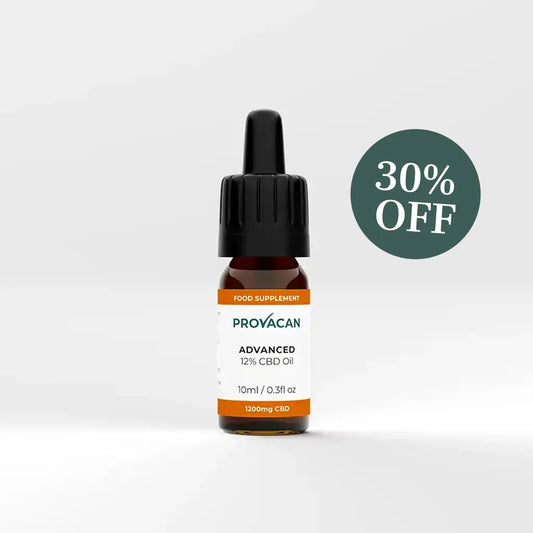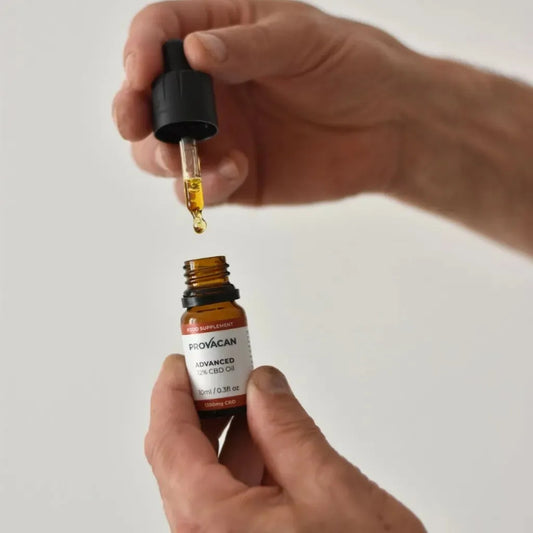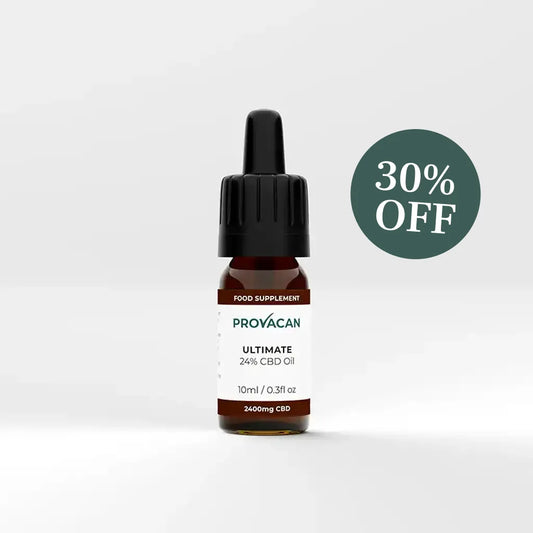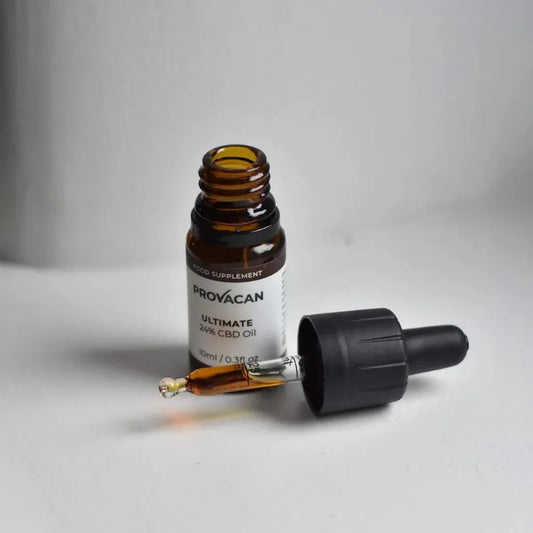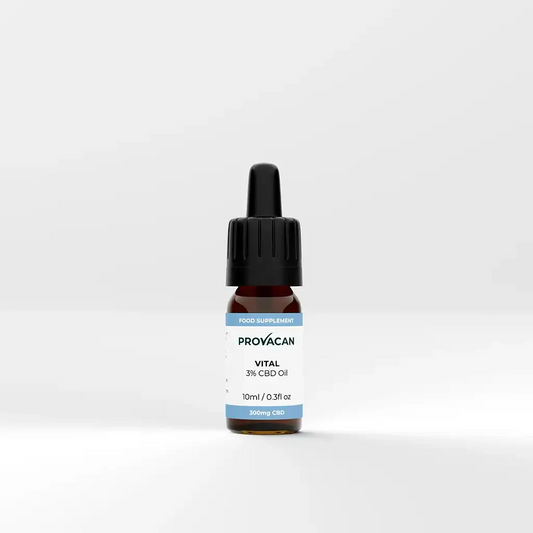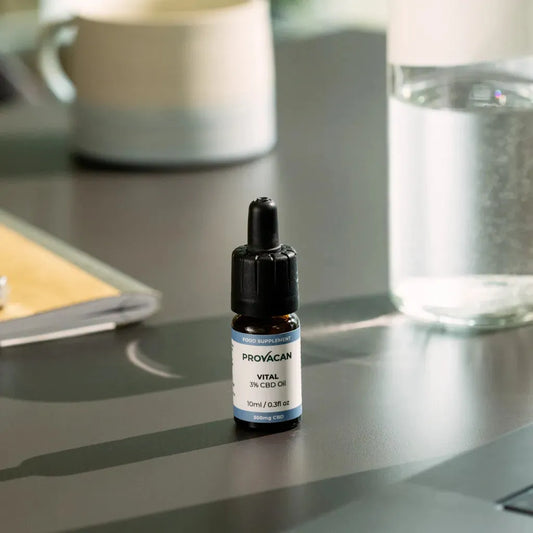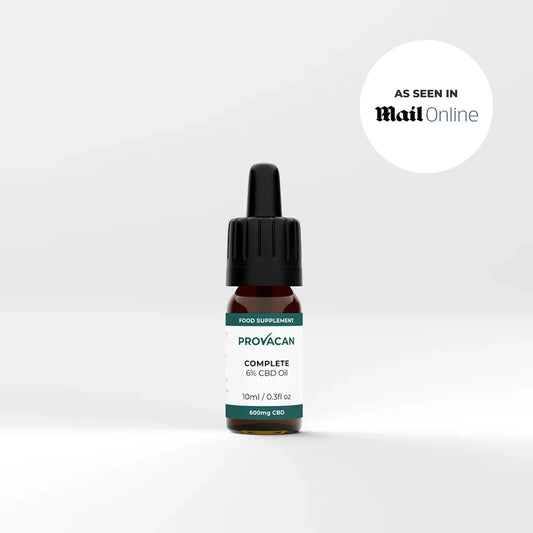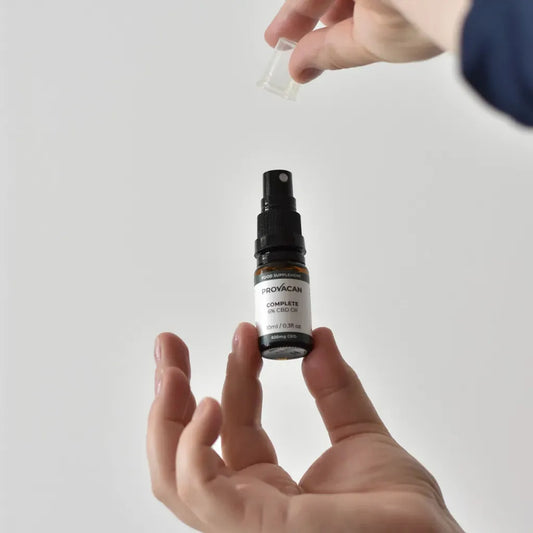Key Takeaways:
- RSO Oil: RSO, or Rick Simpson Oil, is a potent cannabis extract known for its high concentrations of THC and CBD.
- Therapeutic Benefits: RSO oil is used as a natural remedy for pain, inflammation, anxiety, insomnia, and other health conditions.
- Extraction Process: Derived using a specific extraction method, RSO oil offers a strong potency and reported therapeutic effects, making it a popular choice in alternative medicine.
The terms hemp oil and CBD oil are frequently used interchangeably, leading to confusion among consumers. However, these two products are distinct in their composition, extraction methods, and potential benefits. Understanding the differences between hemp oil and CBD oil is essential for consumers seeking to harness the potential wellness benefits of these natural products effectively.
At Provacan, the UK's leading authority in CBD innovation and quality, we are dedicated to providing our customers with accurate information to empower their well-being choices. In this comprehensive guide, we will explore the distinctions between hemp oil and CBD oil, exploring their unique properties, extraction processes, and potential uses.
An Overview: Hemp Oil vs. CBD Oil
What Is Hemp Oil?
Hemp oil, also known as hemp seed oil, is derived from the seeds of the hemp plant. Hemp oil does not contain significant levels of cannabinoids like CBD, but it is rich in nutrients such as omega-3 and omega-6 fatty acids, vitamin E, and protein.
Omega-3 and omega-6 fatty acids are essential for overall health and are known for their anti-inflammatory properties, and may help support cardiovascular health, brain function, and skin health. Vitamin E is a powerful antioxidant that can help protect cells from damage caused by free radicals. Additionally, hemp oil is a good source of plant-based protein, making it a suitable option for those following a vegetarian or vegan diet.
Hemp oil is commonly used in skincare products due to its moisturizing and nourishing properties. It is easily absorbed by the skin, making it a popular choice for hydrating lotions, creams, and serums. The nutrient-rich composition of hemp oil can help improve skin elasticity and texture.
What Is CBD Oil?
CBD, or cannabidiol, is one of over a hundred compounds known as cannabinoids found in the cannabis plant. Unlike tetrahydrocannabinol (THC), CBD does not produce the psychoactive effects that are commonly associated with marijuana use. This makes CBD a popular choice for those seeking therapeutic benefits without experiencing a "high."
CBD oil is commonly used for a variety of health and wellness purposes. It is believed to have potential benefits for conditions such as anxiety, chronic pain, inflammation, insomnia, and epilepsy. Many users report feeling a sense of relaxation and improved well-being after incorporating CBD oil into their daily routine.
When choosing a CBD oil product, it's crucial to look for reputable brands that provide third-party lab testing to verify the potency and purity of their products. This transparency assures customers of the quality and safety of the CBD oil they are purchasing.
The Production Process Of Hemp Oil vs. CBD Oil
Hemp Oil Production Process
Hemp oil, also known as hemp seed oil, is extracted from hemp seeds through a cold-pressing method. The seeds are cleaned and dried before being pressed at low temperatures, which helps retain the nutritional value of the oil. This process ensures that hemp oil contains a rich source of essential fatty acids, vitamins, and minerals.
CBD Oil Production Process
CBD oil is extracted from the leaves, flowers, and stalks of the hemp plant through various extraction methods. One common method is CO2 extraction, where carbon dioxide is used to separate the CBD oil from the plant material. This method is preferred as it is safe and efficient, producing a high-quality and pure CBD extract. Another method is ethanol extraction, where ethanol is used as a solvent to extract the CBD oil.
During the extraction process, the CBD extract goes through additional filtration and purification steps to remove any plant material, chlorophyll, or other impurities, resulting in a concentrated CBD oil.
Key Components: What Makes Them Different
Source and Extraction
Hemp Oil: Derived from the seeds of the hemp plant through cold pressing. This method preserves the nutritional content of the seeds.
CBD Oil: Extracted from the flowers, leaves, and stalks of the hemp plant using various methods, with CO2 extraction being one of the most common for its efficiency in preserving CBD's purity.
Nutritional Content vs. Cannabinoid Concentration
Hemp Oil: Rich in essential fatty acids (Omega-3 and Omega-6), vitamins, and minerals, but contains little to no CBD.
CBD Oil: Known for its high concentration of cannabidiol (CBD), which interacts with the body's endocannabinoid system to potentially offer health benefits such as reducing anxiety, alleviating pain, and promoting well-being.
Cannabinoid Content
Hemp Oil: Minimal to no CBD content.
CBD Oil: Specifically formulated to contain high levels of CBD, making it sought after for its therapeutic properties.
Types of CBD Oil
Full-Spectrum CBD Oil: Contains a wide range of cannabinoids, including CBD, THC (in trace amounts), and other beneficial compounds, offering the "entourage effect," where all components work synergistically.
Broad-Spectrum CBD Oil: Features multiple cannabinoids but is free from THC, making it a choice for those seeking benefits without THC exposure.
CBD Isolate: Pure CBD without any other cannabinoids or compounds, suited for individuals looking for the specific effects of CBD alone.
Legal Considerations
The legal status of hemp oil and CBD oil can vary significantly depending on the country and its regulations. In the UK, both hemp oil and CBD oil are legal as long as they contain less than 0.2% THC, the psychoactive compound found in cannabis.
Hemp oil is typically derived from industrial hemp plants, which contain very low levels of THC. These plants are legal to cultivate in the UK with the proper licenses. Hemp oil is often used in cooking, skincare products, and as a dietary supplement.
CBD oil, on the other hand, is made by extracting CBD from the flowers and leaves of the hemp plant. CBD oil has gained popularity for its potential health benefits, such as reducing anxiety and promoting relaxation. In the UK, CBD oil is legal if it meets certain regulations, including having less than 0.2% THC and being sold as a food supplement.
It's essential for consumers to be aware of the legal landscape surrounding hemp oil and CBD oil in their country. In some places, CBD products may only be available with a prescription or have stricter regulations regarding their sale and use.
Health Benefits Of Hemp Oil And CBD Oil
Hemp Oil
Essential Fatty Acids: Hemp oil is rich in Omega-3 and Omega-6 fatty acids, crucial for heart health, reducing inflammation, and enhancing overall well-being.
Vitamin E: Known for its antioxidant properties, vitamin E in hemp oil helps protect cells from damage.
Protein Source: As a good source of protein, hemp oil is particularly valuable for vegetarian and vegan diets, providing essential amino acids.
CBD Oil
Anxiety and Chronic Pain: CBD oil is celebrated for its potential to alleviate symptoms of conditions such as anxiety and chronic pain, providing a non-psychoactive alternative to traditional medications.
Neuroprotective Properties: Emerging research indicates CBD oil's promise in neurodegenerative disorders, including Alzheimer's and Parkinson's disease, due to its neuroprotective effects.
Anti-inflammatory and Antioxidant: CBD oil's anti-inflammatory and antioxidant effects are beneficial in managing arthritis and skin disorders, showcasing its broad therapeutic potential.
Potential Side Effects Of Hemp Oil And CBD Oil
Here are some of the potential side effects to be aware of when using these products:
Dry Mouth: One common side effect of both hemp oil and CBD oil is dry mouth. This is believed to be due to the cannabinoids affecting saliva production in the mouth.
Dizziness: Some users may experience feelings of lightheadedness or dizziness after consuming hemp oil or CBD oil. This side effect is typically mild and temporary.
Changes in Appetite: Hemp oil and CBD oil can impact one's appetite, causing either an increase or decrease in hunger levels.
Digestive Issues: In some cases, individuals may experience gastrointestinal issues such as diarrhea or stomach discomfort when using hemp oil or CBD oil.
Changes in Mood: While CBD is often used to promote relaxation and calmness, some individuals may experience changes in mood, including feelings of irritability or anxiety.
Medication Interactions: It's important to note that hemp oil and CBD oil can interact with certain medications. If you are taking any prescription medications, it's advisable to consult with a healthcare provider before using these products.
It's a good idea to start with a low dose of hemp oil or CBD oil and monitor your body's response closely. If you experience any severe or concerning side effects, discontinue use and seek medical advice.
Read also:
Frequently Asked Questions on Hemp Oil vs. CBD Oil
What is Hemp Oil?
Hemp oil, commonly referred to as hemp seed oil, is derived from the seeds of the hemp plant. It is rich in nutrients, fatty acids, and useful bioactive compounds. Hemp oil does not contain significant amounts of cannabinoids, such as CBD (cannabidiol).
What is CBD oil?
CBD oil is produced by extracting cannabidiol from the cannabis plant, particularly from the flowers, leaves, and stalks of hemp. CBD oil is known for its therapeutic properties, without the psychoactive effects associated with THC.
How are hemp oil and CBD oil extracted?
Hemp oil is extracted through a process called cold pressing, which is similar to the method used to obtain other vegetable oils. This process helps preserve the purity and nutrient content of the oil.
CBD oil is extracted using several methods, including carbon dioxide (CO2) extraction, ethanol, or hydrocarbon solvents. These methods help isolate and preserve the cannabidiol content and other beneficial cannabinoids and terpenes.
What are the primary uses of hemp oil?
Hemp oil is primarily used for its nutritional value. It is rich in omega-3 and omega-6 fatty acids, making it a great addition to a healthy diet. Hemp oil is also used in skincare products due to its moisturizing properties.
What are the primary uses of CBD oil?
CBD oil is widely recognized for its therapeutic and medicinal benefits. It is used to address a variety of health issues including anxiety, depression, chronic pain, epilepsy, sleep disorders, and inflammation.
What are the legal differences between hemp oil and CBD oil?
In the UK, hemp oil is legal and available without restriction as it does not contain cannabinoids like CBD or THC. CBD oil is also legal in the UK provided it contains less than 0.2% THC, which is the psychoactive compound in cannabis.
Can hemp oil contain CBD?
Hemp oil extracted solely from hemp seeds is not likely to contain any CBD, because the seeds do not usually contain significant amounts of cannabinoids. However, some products marketed as hemp oil may also contain CBD oil, so it is important to read product labels carefully.




